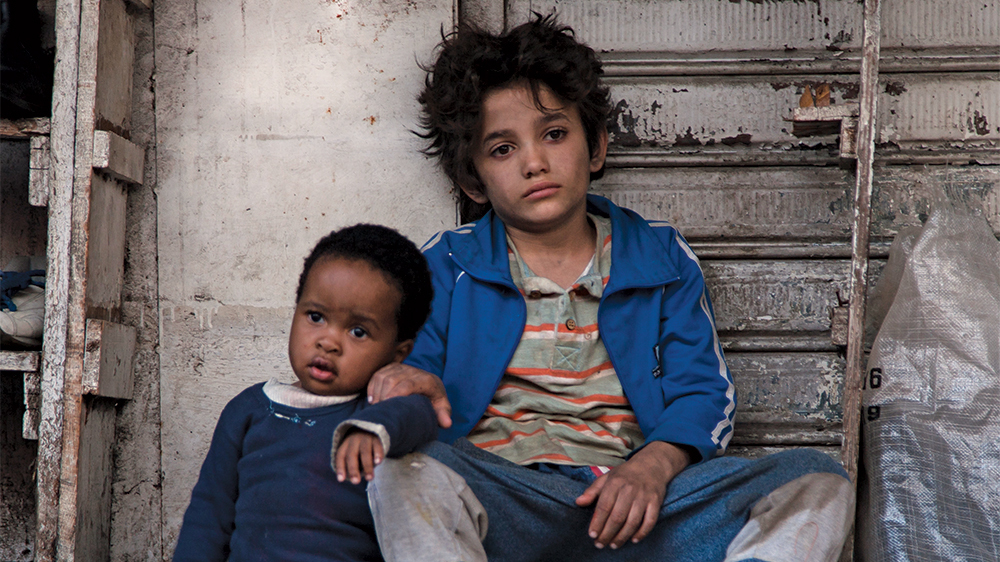Film Review: Capernaum (Chaos) (2018) DIR. Nadine Labaki
© Fares Sokhon
There is so much that is unlikely about this film, yet the sum of its disparate parts is completely wonderful and fully engaging. It is a story of relentless misery which has so much heart, hope and redemption that it makes the unbearable watchable. I am reminded of Shoplifters, the Japanese film directed by Kore-eda. Others will think of Slumdog Millionaire. Both of those are valid comparisons based on the fact that the storylines are somewhat unbelievable and the child actors are thoroughly natural and totally believable. The film won a Cannes Grand Jury Prize this year and will be a contender for best foreign film from Lebanon.
It has a particularly timely resonance as it takes place among the teeming streets of Beirut’s undocumented underclass struggling to scratch out an existence in a hostile environment. Zain, a 12-year old member of a large family has an older brother whom we never meet since he is in jail and an 11-year old sister who he loves and protects fiercely. The family are all involved in various activities, some legitimate and others totally not, to bring in money to support their bare bones lifestyle. The father is feckless and the mother is a tyrant. She has a scam whereby she gets a prescription for the opioid, Tramadol, which she crushes up and dilutes in water. She then dips clothing in the water and brings it so her son in prison where he presumably has a way to reconstitute it back into a salable product. Their lives are always perilous and chaotic since their undocumented status means they have no rights.
When their landlord, who lusts after Sahar, Zain’s beloved sister, starts to press them for the rent, and send gifts to Sahar, Zain knows what will come next. He is wise beyond his age and is the one who explains what it means when she has her first period. The mother is notably absent in that role. When she is sold in marriage to the landlord, Zain has finally had enough and he bolts from his toxic family and finds his way to an amusement park. He finds an ally in the form of Rahil, an undocumented Ethiopian refugee who works as a cleaning lady in an office. She offers Zain a place to live in return for his taking care of her 1-year old son, Yonas. Zain is a natural and is extremely clever and resourceful in finding ways to entertain the small boy while staying indoors all day so as not to be discovered and deported. When Rahil does not come home for days since she has been arrested and put in jail, everything changes, and Zain has to be the caretaker and the breadwinner and they take to the streets.
The resilience and determination of Zain to do whatever it takes, makes him breathtakingly audacious and enterprising. He even resorts to a new version of the Tramadol business, by selling shots of the liquid on the street. All of this while never leaving Yonas alone. He claims Yonas as his brother with a hilarious answer to the question about why he is so dark. There are too many trials and tribulations to go into but when Zain finally gets his day in court after being arrested he becomes a cause célèbre. He brings a lawsuit against his parents for giving him life. The case that he makes is that they have no right to bring children into such a hellish milieu as theirs. And when the judge asks him what he wants to have happen to them. His answer is so smart and unexpected that his point cannot be disputed.
Watching these two young boys is an unalloyed delight. The director has somehow managed to film these untrained non-actors from a child’s eye view to great effect, from the camera angle and including hyper realistic sound design. The chaos of the title is graphically rendered both on the street level as well as some stunning drone shots of Beirut. The great irony of life for Zain is that his dream is to pose as a Syrian immigrant so that he can migrate to Turkey or Sweden where he has heard that people “only die from natural causes”. It is a harsh world for these people. It really inspires empathy for the plight of refugees on a personal level.
You can watch a trailer for the film here.








